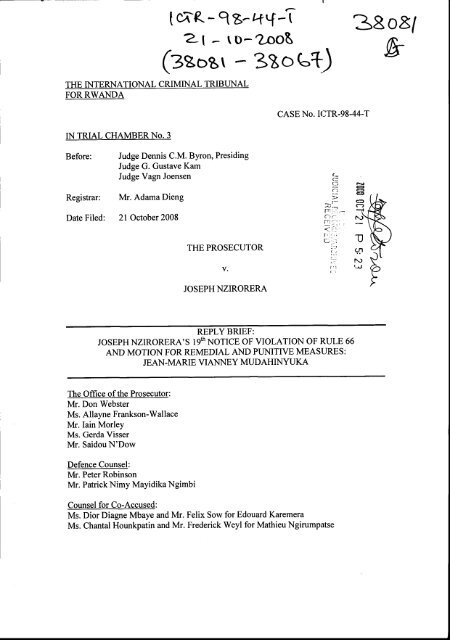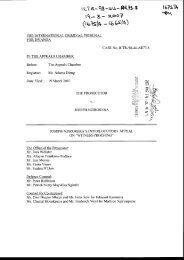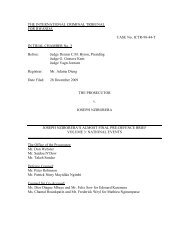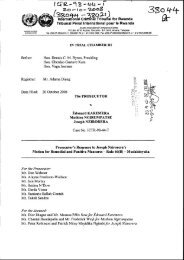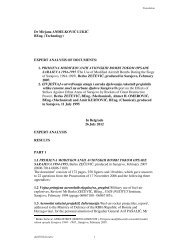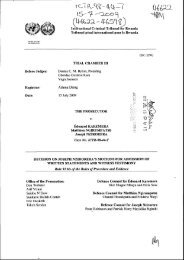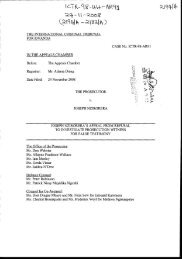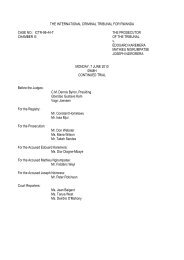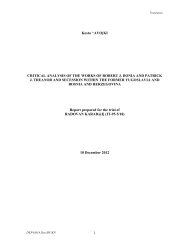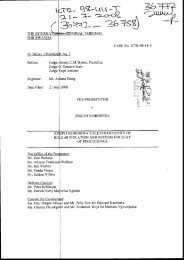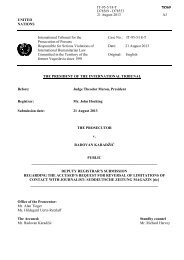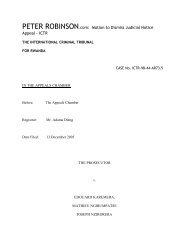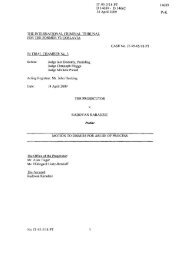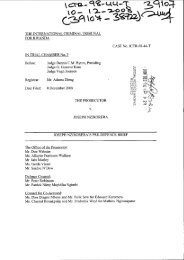Nzirorera Reply - Peter Robinson
Nzirorera Reply - Peter Robinson
Nzirorera Reply - Peter Robinson
Create successful ePaper yourself
Turn your PDF publications into a flip-book with our unique Google optimized e-Paper software.
Ici-R-qE-4Lf-(<br />
2-t F tD-2oo&<br />
(zxotr -- 38"tl)<br />
THE INTERNATIONAL CRIMINAL TRIBUNAL<br />
FOR RWANDA<br />
3sos/<br />
CASE No. ICTR-98-44-T<br />
IN TRIAL CHAMBER NO. 3<br />
Before:<br />
Registrar:<br />
Date Filed:<br />
Judge Dennis C.M. Byron, Presiding<br />
Judge G. Gustave Kam<br />
Judge Vagn Joensen<br />
Mr. Adama Dieng<br />
21 October 2008<br />
THE PROSECUTOR<br />
v.<br />
(_<br />
(_-<br />
;<br />
t<br />
*tl-n<br />
i r-: r-:<br />
( _rarn<br />
'"'i -<br />
'_l--,r-'<br />
3R o8o<br />
l. We have yet another OTP disclosure scandal on our hands.<br />
2. Joseph <strong>Nzirorera</strong> has moved for immediate disclosure of all information<br />
obtained from Jean-Marie Vianney Mudahinyuka, and for remedial and lrunitive<br />
sanctions for the non-disclosure.<br />
3. On 20 October 2008, there was filed the Prosecutor's Response to Joseph<br />
<strong>Nzirorera</strong>'s Motionfor Remedial and Punitive Measures - Rule 66(8) - Mudahinyuka.<br />
Mr. <strong>Nzirorera</strong> now replies.<br />
4. As of 23 January 2006,the prosecution knew that Jean Marie Vianney<br />
Mudahinyuka was a potential defence witness for Mr. <strong>Nzirorera</strong> by virtue of its receipt of<br />
Joseph <strong>Nzirorera</strong>'s Ex Parte Motion for Order for Interview of Defence Witness NZI . ln<br />
an annex to that motion, the precise exculpatory information that the defence believed<br />
Mr. Mudahinyuka possessed was set out in detail.<br />
5. On 30 January 2006, Mr. <strong>Nzirorera</strong> filed a Motionfor Order (loncerning<br />
[Jnlowful Disclosure of Ex Parte Defence Filing andfor Stay of Proceedings. On 16<br />
February 2006,the Trial Chamber ordered as follows:<br />
"The Chamber denies <strong>Nzirorera</strong>'s motion for a stay of proceedings, grants the<br />
Defence request that the ex parte annex be destroyed and deleted from any<br />
Prosecution file, and orders the Prosecution to refrain from contacting<br />
Witness DNZI, or his legal representative, until the Chamber has decided the<br />
merits of the motion."' (emphasis added)<br />
6. As now revealed by the prosecution's Prosecutor's Response to Joseph<br />
<strong>Nzirorera</strong>'s Motionfor Remedial and Punitive Measures - Rule 66(8) - Mudahinyuka<br />
(20 October 2008), the prosecution flagrantly violated that order!<br />
7. The mission report of OTP investigator Jacques Baillargeon attached to the<br />
Response demonstrates that he traveled to the United States and interviewed Jean Marie<br />
I Transcript of 16 February 2006 @ll
3aoT?<br />
Vianney Mudahinyuka starting on l0 July 2006. Since he was met at the prison in<br />
Pennsylvania by the lawyers for Mudahinyuka, who travelled from lllinrlis, it must be<br />
presumed that OTP had contact with Mr. Mudahinyuka's legal represenlative even earlier<br />
than l0 July 2006.<br />
8. At the time of these contacts and interview with Mudahinyuka, the stay ordered<br />
by the Trial Chamber remained in effect. The Trial Chamber did not issue its Decision<br />
on <strong>Nzirorera</strong>'s ex parte Motion for Order for Intemiew of Defence Witnesses NZl, NZ2,<br />
and NZ3 until l2 July 2006. Ironically, at the time the stay was lifted, the investigators<br />
were merrily conducting their third full day of interviews with Mr. Mud,rhinyuka.<br />
9. This is an outrageous breach of the Trial Chamber's order and demands a<br />
serious sanction.<br />
10. But that is only the beginning.<br />
11. It its decision on the merits, the Trial Chamber found that the information<br />
likely possessed by Mudahinyuka "could not be obtained through other means and<br />
therefore was necessary for the conduct and the fairness of this trial." Htlwever, it denied<br />
the motion for a subpoena to Mr. Mudahinyuka on the grounds that "it is unlikely that a<br />
subpoena will produce the degree of cooperatio needed for Defence Counsel for<br />
<strong>Nzirorera</strong> to interview the witness."2<br />
12. The prosecution knew immediately that this was not the case. During the<br />
week of 10 July 2006, Mr. Mudahinyuka spent four full days with its investigators<br />
discussing every aspect of the information for which the subpoena had been sought. Yet<br />
the prosecution never informed Mr. <strong>Nzirorera</strong> or the Trial Chamber that in fact Mr.<br />
2 Decision, at para. 12
3goTs<br />
Mudahinyuka had willingly given the very same information that the Trial Chamber<br />
found was 'onecessary for the conduct and the fairness of this trial".<br />
13. The failure of the prosecution to disclose the fact of its interviews with<br />
Mudahinyuka was prosecutorial misconduct. It had an affirmative duty, as an officer of<br />
the Court, to disclose that Mudahinyuka was in fact available to be subpoenaed and had<br />
provided the very information sought by the defence, and more.<br />
14. Moreover, information from Mudahinyuka has been specific,elly requested by<br />
Mr. <strong>Nzirorera</strong> as far back as 13 July 2005.3 The prosecution was not ordered to produce<br />
such material based solely on its representation that it had not obtained any information<br />
from Mudahinyuka.a<br />
15. As the Chamber now knows, the prosecution did not disclose the existence of<br />
these meetings with Mudahinyuka until counsel for Mr. <strong>Nzirorera</strong> finally caught up with<br />
Mudahinyuka in September 2008, more than two years after these intenriews, and<br />
Mudahinyuka exposed the existence of the prosecution'secret meetings.<br />
sanction.<br />
16. This is a serious breach of prosecutorial ethnics and demands a serious<br />
17. But there is more.<br />
18. The prosecution deliberately destroyed the evidence of these'meetings.<br />
19. The mission report of Investigator Jacques Baillargeon attached to the<br />
Response shows that the OTP investigators covered a huge amount of material in the four<br />
days which are directly relevanto Mr. <strong>Nzirorera</strong>'s trial, including:<br />
--Creation of MRND Interahamwe in December 1991<br />
3 Joseph <strong>Nzirorera</strong>'s Second Motion to Compel Inspection and Disclosure.<br />
a Decision on Motions to Compel Inspection and Disclosure and to Direct lilitnesses to Bring Judicial and<br />
Immigration Records (14 September 2005) atpara.16
3RW4<br />
--Relations with Georges Rutaganda<br />
-political situation in Rwanda l99l'92<br />
--MRND power inl99l-94<br />
--Mathieu NgirumPatse<br />
--Joseph <strong>Nzirorera</strong><br />
-Opposition parties in 1992<br />
--Creation of Interahamwe in Gitarama-'l992<br />
--Prefectural commiffee of Gitarama<br />
--Phineas Ruhumuliza<br />
--security in Kigali between 1990-94<br />
--relations with Interahamwe national committee of Kigali 1992-94<br />
--the popular meetings in Kigali and his participation<br />
--relations between Robert Kajuga and Prefet Tharcisse ltenzaho<br />
--relations of Renzaho with Francois Karera, Jean Habyrrimana, and<br />
Bernard Maniragaba<br />
--identification of the enemy by Renzaho<br />
--Ephrem Setako and MRND relations<br />
20. This corresponds very closely with the account of the rrneetings given by<br />
Mudahinyuka to counsel for Mr. <strong>Nzirorera</strong>. Mudahinyuka's information on these topics<br />
is highly exculpatory in that he indicates that the fact that the Interahamwe was never<br />
formed for the purpose of killing Tutsis, that the killing of Tutsis was never discussed in<br />
Interahamwe committee meetings, that he knew of no military training or distribution of<br />
weapons to Interahamwe prior to the death of President Habyarimana, that the
38o16<br />
Interahamwe never compiled lists of Tutsis, that he had attended MRND rallies and never<br />
heard any of the accused call for the extermination of Tutsis, that Georges Rutaganda<br />
never distributed weapons and in fact saved many Tutsis after the death of the President,<br />
that he knew of no orders by the MRND to establish roadblocks or kill Tutsis, and that he<br />
had no contact with any of the accused after the death of the President.<br />
s<br />
21. Therefore, unless Mr. Mudahinyuka told the OTP investigators the complete<br />
opposite of what he told counsel for Mr. <strong>Nzirorera</strong>, the information in the possession of<br />
the OTP as of July 2006 was exculpatory.<br />
22. What did the Office of the Prosecutor do with this information? They<br />
certainly never disclosed it to the defence. Instead, their own accounts are conflicting.<br />
One of the investigators, Rejean Tremblay, claims "no statements or investigator's notes<br />
were taken." The other investigator, Jacques Baillargeon, says:<br />
"The note taken were only taken as reference for completing our report<br />
who was officially given to our superiors and destroyed after cornpletion<br />
of this one."<br />
23. Therefore, it appears that notes of the information provided over four days by<br />
Mr. Mudahinyuka covering a wide range of topics of direct relevance to this case were<br />
destroyed.<br />
24. This non-disclosure and destruction of exculpatory material is extremely<br />
serious and requires a serious remedy and sanction from the Trial Chamber. Were it not<br />
for counsel's dogged persistence of Mr. Mudahinyuka, this information never would have<br />
come to light.<br />
s Joseph <strong>Nzirorera</strong>'s ly'h Notice of Rute 66 Violation and Motionfor Remedial and Punitive Measures:<br />
Jean-Marie Vianney Mudahinyuka (6 October 2008) at parc. 14. To avoid any questit:n about the<br />
exculpatory content of Mr. Mudahinyuka's information, Mr. <strong>Nzirorera</strong> attaches the pertinent excerpts from<br />
the report of his lead counsel's interview with Mudahinyuka to this reply as Annex "A".
33o+5<br />
25.In summary, the Mudahinyuka affair reveals that the prosecution (l) violated<br />
an express order of the Trial Chamber not to have contact with Mr. Mudahinyuka or his<br />
legal representative; (2) failed to inform the defence or Trial Chamber that Mr.<br />
Mudahinyuka was willing to provide information relevant to this case after the Trial<br />
Chamber declined to order a subpoena, believing efforts to convince Mudahinyuka to talk<br />
would be fruitless, and (3) violated Rules 66(8) and 68 by withholcling material and<br />
excu lpatory informati on received from Mudahinyuka.<br />
26.The Trial Chamber is requested to take the following action:<br />
Frrsf: Make an express finding that the prosecution violated the order that it have<br />
no contact with Mudahinyuka or his legal representative;<br />
Second: Make a finding that the prosecution's conduct in withholding the<br />
information that it had met with Mudahinyuka and he was willing to discuss the events<br />
constituted conduct which obstructed the proceedings and is contrary to the interests of<br />
justice warranting sanctions pursuant to Rule 46( ).<br />
Third: Make a finding that the prosecution violated Rule 66(8) by failing to<br />
timely disclose the information obtained from Mudahinyuka, which was material to the<br />
preparation of Mr. <strong>Nzirorera</strong>'s defence.<br />
Fourth: Make a finding that the prosecution violated Rule 68 by failing to<br />
disclose as soon as practicable exculpatory information obtained from Mudahinyuka.<br />
Should the Chamber be in any doubt as to the exculpatory nature of the information<br />
provided by Mudahinyuka, an oral hearing is requested at which Mudahinyuka and the<br />
two investigators would testifY.
3ao+e1<br />
27. Based upon these findings, the Trial Chamber should take the following<br />
remedial and punitive measures:<br />
First: Order a mistrial as a result of the pervasive and ongoing violations which<br />
have deprived Mr. <strong>Nzirorera</strong> of a fair trial, or, failing that, issue a sta.y of proceedings<br />
until it can be established that the prosecution has fulfilled its disclosu.re obligations by<br />
appointment of a special master to review the holdings of the prosecution; and;<br />
Second: Order an investigation pursuant to Rule 77, to be conducted by an amicus<br />
curiae, into violation of the Trial Chamber's orders and obstruction of justice by<br />
members of the Office of the Prosecutor; or, failing that, sanction the intlividual members<br />
of the prosecution team pursuant to Rule 46(4) and<br />
Third: Order whatever additional measures<br />
believes are required for both<br />
remedial and punitive measures.<br />
28. It need not be recalled to this Trial Chamber that this would be the l4th Rule<br />
68 violation found in this case. When finding the 13ft violation, this Trial Chamber said:<br />
"Although the Chamber is not prepared to state that the Prosecution<br />
can no longer be relied upon to discharge its Rule 68 obligations in<br />
this case, it notes that the Prosecution's compliance with the rules<br />
of disclosure has been less than adequate thus far. In fact, the Chamber<br />
finds that the increasing number of disclosure violations by the<br />
Prosecution is quickly approaching the threshold for sanctions of a<br />
more serious nature than mere disclosure of the misconduct to an<br />
internal disciplinary body. The Chamber hereby wams the Prosecution<br />
that future disclosure violations will not be met with the same lenience<br />
that has been displayed to date."6<br />
29. The response to this motion from the prosecution fails to acknowledge any<br />
disclosure violation or omission on its part. In fact,it makes the same argumenthat the<br />
Trial Chamber explicitly rejected in its earlier decision-that its disclosure two years<br />
6 Decision on Joseph <strong>Nzirorera</strong>'s Eleventh Notice of Rule 68 Violation and Motion for Stay of Proceedings<br />
(l I September 2008) at para. 30
3a o+s<br />
later when it has been caught red-handed constitutes compliance with its disclosure<br />
obligations. This argument was found to "strain credulity" by the Trial Chamber.<br />
Nevertheless, as a measure of how little the prosecution has learned irnd how much it<br />
regards the decisions of the Trial Chamber, the identical was repeated again here.7<br />
30. These violations, and the prosecution's attitude when caught, are a direct<br />
result of the impunity with which the prosecution has been allowed to operate in these<br />
proceedings, and which has made a shambles of Mr. <strong>Nzirorera</strong>'s right to a fair trial.<br />
31. Mr. <strong>Nzirorera</strong> respectfully requests that the Trial Chamber grant the relief he<br />
has requested in this motion. While he has been disappointed and let down by the Trial<br />
Chamber at every turn, even after three years, hope springs eternal.<br />
PE'TER ROB<br />
Lead Cosnsel for Joseph Nzirorers<br />
t Compare Response at para. 9 with Decision on Joseph <strong>Nzirorera</strong>'s Eleventh Notice o"ftvls 68 Violation<br />
and Motionfor Stay ofProceedings (11 September 2008) atpara. 17
ANNEX $A)'<br />
38oTa
3to11<br />
PETER ROBINSON<br />
International Criminal Law<br />
P.O. Box 1844<br />
Santa Rosa, California 954O2 USA<br />
Tel: L (7O7) 575-O54O<br />
Fax: 1 (2O8) 694-6161<br />
E-mail : peter@oeterrobinson.com<br />
To: Joseph <strong>Nzirorera</strong><br />
From: <strong>Peter</strong> <strong>Robinson</strong><br />
MEMORANDUM<br />
Re: Interview of Jean Marie Vianney Mudahinyuka<br />
Date:27 September 2008<br />
JEAN MARIE VIANNEY MUDAHINYUKA, immigration number A78782984,<br />
was interviewed on 27 September 2008 by <strong>Peter</strong> <strong>Robinson</strong> at McHenry County<br />
Corrections Center, Woodstock, Illinois, USA.<br />
MUDAHINYUKA first apologized for not responding to my letters and said he<br />
was happy to see me. He said that he had become a better person while in prison by<br />
studying the Bible and bringing God into his life.<br />
MUDAHINYUKA said that he was still undergoing deportation proceedings to<br />
Rwanda, but that the immigration officer had found that he had a reasorrable fear if<br />
deported. He was awaiting proceedings before an immigration judge.<br />
MUDAHINYUKA advised that he had been interviewed in the past by<br />
representatives of the ICTR Office of the Prosecutor. The first occasion was when he<br />
was interviewed by Stephen Rapp while he was in the Metropolitan Corrections Center in<br />
Chicago (approximately 2004). Rapp asked him questions about the Rrvanda events, but<br />
at the end of the interview told MUDAHINYUKA that his information was of no value to<br />
OTP.<br />
MUDAHINYUKA advised that in 2007, while he was incarcerated at Allenwood<br />
Federal Correctional Institution in Pennsylvania, he was visited by two investigators of<br />
the ICTR Office of the Prosecutor. He did not recall their names, but b,:lieves they were<br />
Canadians. MUDAHINYUKA advised that he was interviewed over 2 days from 9 a.m.<br />
to 4 p.m. He was asked many questions about the Interahamwe and the Rwandan events.<br />
ll
3Roao<br />
He believes that the interviews were tape recorded. The investigators talked to him about<br />
pleading guilty and testifying against <strong>Nzirorera</strong>, Ngirumpatse, Renzaho and others in<br />
Arusha. 1r{UOAHnIYUKA said that he was asked during his interviews with OTP about<br />
Georges Rutaganda. The investigators said they would be back.<br />
MUDAHINYUKA advised that about 3 months later, a group of four people<br />
came back to Allenwood from ICTR. The two investigators returned, as well as a lawyer<br />
named Jonathan, believed to be from New Zealand, and another person, who was<br />
possibly Somalian. They spent a few days interviewing MUDAHINYUKA. He believes<br />
ihr int.*i"ws were tape recorded. They said that if he admitted being responsible for<br />
killing at least one person and pled guilty, they could recommend a sentence for him at<br />
the IC}R of less than l0 years, to run concurrent with the time he had already served in<br />
the United States. They also said it might be possible to serve the remainder of his<br />
sentence in the United States and that he would not have to face any prosecution in<br />
Rwanda.<br />
MUDAHINYUKA said they gave him overnight to think about it. When they<br />
returned, he told them that he had no killed anyone and could not plead guilty to crimes<br />
that he did not commit. He has had no contact with them since.<br />
MUDAHINYUKA advised that he was indeed a member of the national<br />
committee of the Interahamwe. His involvement stemmed from his closre friendship with<br />
Georges Rutaganda.<br />
MUDAHINYUKA said that Georges Rutaganda was not really enthusiastic about<br />
the MRND. He joined because his father was recruited for MRND. MIJDAHINYUKA<br />
joined for the same reason, as Rutaganda was his best friend.<br />
MUDAHINYUKA said that President Habyarimana was a good guy and did not<br />
discriminate against Tutsis. He gave several examples of very big businessmen who<br />
were friends of President Habyarimana and profited greatly during his regime. He said<br />
that he met President Habyarimana on one occasion with the other members of the<br />
national committee of Interahamwe.<br />
MUDAHINYUKA advised that the reason Georges Rutaganda joined the national<br />
committee of the Interahamwe was because he hoped to be a Minister someday.<br />
MUDAHINYUKA joined the national committee of the Interahamwe simply because<br />
Rutaganda asked him to.<br />
MUDAHINYUKA said that in his long friendship with Georges Rutaganda, he<br />
never knew him to dislike Tutsis, and in fact, Rutaganda worked for anclwith Tutsis<br />
easily.<br />
MUDAHINYUKA said that he had worked for the Ministry of Irinance from<br />
1984-89 and had been fired because he was from the south. Therefore, he was not<br />
inclined to support the MRND in the multi-party system and believed that the party was<br />
t2
38oGq<br />
controlled by people from the north. He believes, in retrospect, that the MRND corrupted<br />
people like Rutaganda's father, Ngirumpatse, and Mugenzi as part of their hope to stay in<br />
power.<br />
MUDAHINYUKA said that the national committee of the Interahamwe was<br />
comprised of people who were very sociable and who had some money, and was not<br />
formed to exterminate Tutsis, nor was that ever its objectives. He said that he signed<br />
letters as part of the national committee whenever he was asked to do so, but did not pay<br />
much attention to the content.<br />
MUDAHINYUKA advised that the Interahamwe had no involvementinthe 1992<br />
events in Bugesera as far as he knew. Attacks against Tutsis were never discussed or<br />
planned by the national committee of the Interahamwe.<br />
MUDAHINYUKA said he attended the November 1992 MRND rally in<br />
Ruhengeri at which President Habyarimana addressed those in attendance. He said that<br />
when President Habyarimana talked about descending with the lnterahamwe, he was<br />
referring to campaigning for election, not attacking Tutsis.<br />
MUDAHINYUKA advised that he had not attended the rally in Nyamirambo<br />
stadium after the death of President Ndadaye of Burundi. He said that he did attend the<br />
rally in Nyamirambo stadium at which Justin Mugenzi spoke. MUDAFTINYUKA said<br />
that he never heard Ngirumpatse urge the extermination of or attacks on Tutsis.<br />
However, some of the discourse by political leaders equated the Tutsi with the enemy in<br />
his opinion.<br />
MUDAHINYUKA advised that he had no knowledge of military training of<br />
Interahamwe before the death of President Habyarimana. However, when the war broke<br />
out and Interahamwe went immediately to the front, he deduced that some training had<br />
taken place in secret.<br />
MUDAHINYUKA said that he had no knowledge of distribution of weapons to<br />
lnterahamwe before the death of President Habyarimana.<br />
MUDAHINYUKA said he knew Abubucar Turatsinze only as a driver/messenger<br />
for Ngirumpatse. To his knowledge, Turatsinze was never a leader or trainer of<br />
Interahamwe. MUDAHINYUKA knew of no plan to kill 1000 Tutsis in 20 minutes as<br />
alleged by Turatsinze. MUDAHINYUKA said he never heard that Turatsinze had sold<br />
weapons to Burundians.<br />
MUDAHINYUKA advised that he received credits from SORS'AL, which he<br />
paid back. He said that his status as an Interahamwe national committee member helped<br />
him get these credits, but that none of the money was used to finance any Interahamwe<br />
activities.<br />
l3
3go6s<br />
MUDAHINYUKA said that he had no contact ever with Joseph <strong>Nzirorera</strong> or<br />
Edouard Karemera. He said that he saw Mathieu Ngirumpatse at some meetings with the<br />
national committee of the Interahamwe prior to the death of President Habyarimana.<br />
Ngirumpatse was planning for the elections. After the death of President Habyarimana,<br />
MUDAHINYUKA never saw any of the three men.<br />
MUDAHINYUKA said that he never attended nor heard of a fund raising meeting<br />
held for the Interahamwe at the Hotel Rebero.<br />
MUDAHINYUKA said that after the death of President Habyarimana, he<br />
remained home in Nyamirambo for three days. He never received or knew about any<br />
orders for Interahamwe to man roadblocks or kill Tutsis. He never wenl to the Diplomat<br />
Hotel after the death of President Habyarimana, nor had he been asked t,r do so.<br />
MUDAHINYUKA said that on l0 April1994, he went to his native commune in<br />
Gitarama where he stayed with his family. His mother was Tutsi. His family sheltered a<br />
lot of Tutsi. In April, his father's house was attacked by Interahamwe liom his<br />
commune. They killed his uncle and attacked some of his cousins. His wife later died of<br />
poisoning in Gitarama.<br />
MUDAHINYUKA said that he returned to Kigali and Georges Rutaganda<br />
protected him. Rutaganda was protecting many Tutsis at Amgar garage. He took several<br />
to the Milles Collines hotel. Rutaganda was doing his busines selling beer and other<br />
goods, and at the same time protecting many people at his place.<br />
MUDAHINYUKA observed that Robert Kajuga was hiding at R.utaganda's<br />
business and was being hunted by people who wanted all Tutsis to be killed. Rutaganda<br />
helped Kajuga to survive in those days.<br />
Later,when MUDAHINYUKA felt his life was in danger from trnterahamwe who<br />
had attacked his family, he asked Robert Kajuga for a weapon and two l.nterahamwe to<br />
protect him and received that from Kajuga.<br />
MUDAHINYUKA said he never heard of Rutaganda obtaining weapons for<br />
Interahamwe national committee members or distributing weapons to anyone. The<br />
stories about Rutaganda doing so were pure lies because MUDAHINYUKA was with<br />
Rutaganda most of the time during April-June 1994.<br />
MUDAHINYUKA said that he knew a man named Degaul, and that he had died<br />
during the 1994 events, but said that he and Rutaganda had nothing to do with his death,<br />
and never said so to Dieudonne Niyitegeka or anyone else. He said that Rutaganda never<br />
obtained a weapon for Dieudonne Niyitegeka to his knowledge.<br />
t4
SgoE+<br />
MUDAHINYUKA said that he heard that Rutaganda had gone out to the<br />
roadblock and helped save the refugees from the Milles Collines hotel who were stopped<br />
there by Interahamwe during their evacuation.<br />
MUDAHINYUKA said that Rutaganda, at great personal risk, had transported<br />
Tutsis in his convoy from Gitarama to Cyangugu and saved their lives'<br />
MUDAHINYUKA said that after the RPF came, 46 members of his family,<br />
including his 6 year old son Thierry were killed by the RPF, which gathered them all in a<br />
house in Ruhango and set the house on fire. The victims were members of the Josias<br />
Mugiraneza family.<br />
MUDAHINYUKA said that after leaving Gitarama in June l994,he went to<br />
Cyangugu. He left Rwanda at the beginning of July for Bukavu, Zaire. He went to<br />
Ouvera, Zairewhere he remained until 1996. Then he went on foot with family members<br />
to Zambiaover a six month period. He stayed inZambia from 1997-2000. In 2000, he<br />
came to the United States. He was arrested in May 2004 in Illinois for false statements<br />
on his immigration documents and assaulting a federal officer. He pled guilty and<br />
finished serving his sentence in February 2008. He is now in the custody of immigration<br />
officials awaiting a decision on his deportation to Rwanda.<br />
t5
TRANSMISSION SHEET<br />
FOR FItIl{G OF DOGUIUIENTS WITH GM$<br />
.': r;tI ir i I I il{ffiffiffi}lffi,S*1"]:.:...':':'<br />
COURT MANAGEMENT SECTION<br />
(Art. 27 of the Directive for the Regis!ry)<br />
I . OINIRAL INFORMATIO]I<br />
U TrialChamber I<br />
To:<br />
N. M. Diallo<br />
ll Chief, CMS<br />
J.-P. Fom6t6<br />
From:<br />
Llchamber<br />
(names)<br />
be completed by the Ghambers / Flllng<br />
ll TrialChamber ll X lrlatChamber lll t TrialChamber lll<br />
R. N. Kouambo C. K. Hometowu A. N'Gum<br />
lJ Appeals Chamber / Arusha<br />
!A peals Chamber / The Hague<br />
Chamber ll<br />
K K. A. Afande<br />
F. A. Talon<br />
R Muziqo-Morrison<br />
llil Defence<br />
ll Prosecutor's Office L Other:<br />
<strong>Peter</strong> <strong>Robinson</strong><br />
(names)<br />
(names)<br />
(names)<br />
Gase Name: The Prosecutor vs. Joseph <strong>Nzirorera</strong><br />
Gase umber: ICTR-98-44-T<br />
Dates: Transmitted: 21 October 2008 Document's date: 2 October 2008<br />
No. of Pages: 15 OriginalLanguage: XEnglish trF ench ! Kinyanruanda<br />
Title of NEPI.Y BNIEF: JOSEPH NZIRORERA'S 1gth NOTICE OF VIOLATI)N OF RULE 66<br />
Document: AND MOTION FOR REMEDIAL AND PUNITIVE MEASURES:<br />
JEAN.MARIE VIANNEY MUDAHINYUKA<br />
Glassification Level:<br />
TRIM Document Type:<br />
! ex Parte<br />
! Indictment tr Warrant E Correspondence! Submission from non-parties<br />
n Strictty Gonfidential/ Under Seal E Decision E Afiidavit E Notice of Appeal X Submission from parties<br />
n Confidential<br />
X puotic<br />
E Disclosure E order flAppeal Book n Accused particulars<br />
E Judgement tr Motion E Boot of Authoritier<br />
il . TRAl{ElATtOl{ STATUS ON THE FILING DATE (To be completed<br />
CttlSSnn-L take necessary action regarding translation.<br />
X fiting party hereby submits only the original, and will not submit any translated vt d&.<br />
l'lT',i<br />
n Reference material is provided in annex to facilitate translation.<br />
Target Language(s):<br />
I English ! French n K[ry<br />
*<br />
(-l .-<br />
n-i':". : ,<br />
&ano" !<br />
CfvtS SnnlL NOT take any action regarding translation.<br />
-':<br />
t\)<br />
I Filing Party hereby submits BOTH the original and the translated version for filingas,followlsir<br />
(.)<br />
Oriqinal in I English I French I Kinyarwanda<br />
Translation in E English flFrench El Kinyarwanda<br />
CtrlS SHRIL NOT take any action regarding translation.<br />
! fiting Party will be submitting the translated version(s) in due course in the folloting language(s):<br />
n eng[sn n French n xinYrrwanda<br />
KINDLY FILL 11{ THE BOXES BELOW<br />
E fne OTP is overseeing translation.<br />
ll DEFENCE is overseeng translation.<br />
The document is submitted for translation to:<br />
The document is submitrd to an accredited service for<br />
I The Language Services Section of the ICTR / Arusha. translation (fees will be s rbmitted to DCDMS):<br />
n fne Language Services Section of the ICTR / The Hague. Name of contact person:<br />
f] nn accredited service for translation; see details below: Name of service:<br />
Name of contact person:<br />
Address:<br />
Name of service:<br />
E-mail/ Tel. / Fax:<br />
Address:<br />
E-mail/Tel./Fax:<br />
lll - TRAN8IATION PRIORITIEATIOII (For Offlclal use ONL<br />
nTop priority COMMENTS nF4uired date:<br />
nUrgent<br />
D Normal<br />
c3<br />
C?<br />
t\)<br />
nF:aring date:<br />
nc:her deadlines:<br />
I<br />
NB: This form is available on: http://www.ictr.org/ENGL|SH/cms/cms1.doc C (Updated on 0{ August 2008)


